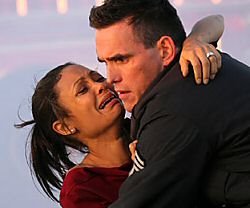 Gripping and very moving stuff, but still somehow a bit contrived. Much of the dialogue rings false, starting with the opening 'crash' of Angeleno ethnicities in which a Chinese tailgater calls Jennifer Esposito's well turned out policewoman a "wetback".
Gripping and very moving stuff, but still somehow a bit contrived. Much of the dialogue rings false, starting with the opening 'crash' of Angeleno ethnicities in which a Chinese tailgater calls Jennifer Esposito's well turned out policewoman a "wetback".It's all based on the shaky premise that you can win the battle against stereotypes by confronting your characters (and your audience) with individuals that only outwardly conform to them − such as the Mexican locksmith covered in marero tattoos who turns out to be the ideal loving father and family man.
We witness LA as the messed-up metropolis where the bad are capable of doing good and the good of doing bad. Roger Ebert sees reason for New World optimism at then end:
"Until several hundred years ago, most people everywhere on earth never sawContrast this with the view expressed by a ranting character in Michel Houellebecq's Platform: that old style racism was "benevolent" because white men considered other races inferior and it is hard to feel genuine hatred for an inferior; "at most a sort of cordial contempt". The new kind of racism is masochistic, with all unblended races feeling increasingly anxious, if not downright inferior. Anyway, Ebert's remarks confuse racism with xenophobia, which is one of the faults of this movie, and perhaps of America as a whole.
anybody who didn't look like them. They were not racist because, as far as they
knew, there was only one race."
Yet it is a very good movie, and in parts a very funny one too. One to watch more than once. Don Cheadle and Matt Dillon are a pair of actors I have a lot of time for.
Like both Magnolia and Short Cuts (and to a lesser extent Traffic, though its influence is clear) this is one of those narratives made up of lots of connected personal stories, the connections here tending to emphasise the ironies underpinning the central theme. As the end of the second hour approaches, Crash looks as if it's struggling to find its ending, but you sense that at least one member of the ensemble cast might have to end up dead before the titles run. And when it comes, even this script can't lay on a big surprise.
The brother always gets it.

No comments:
Post a Comment